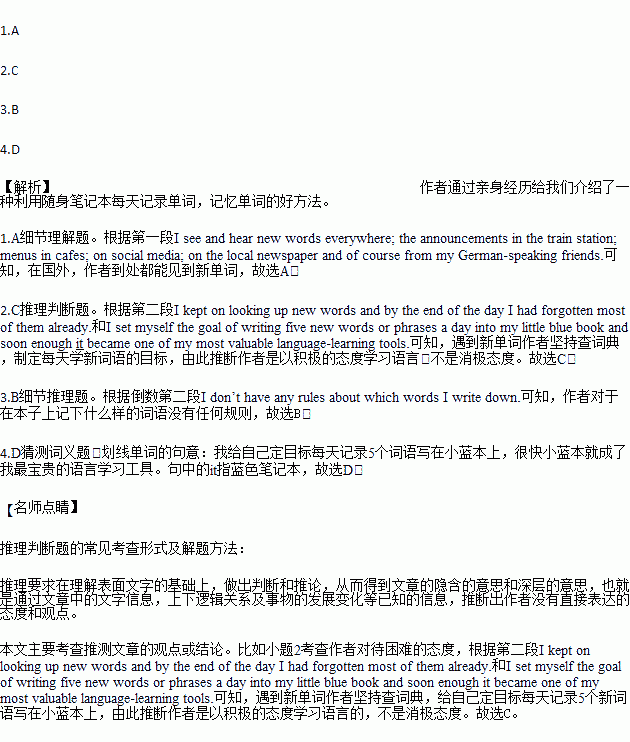题目内容
In my bag I always carry the same essential items: my keys, my purse, some loose change, my mobile phone and my little blue vocabulary notebook. This year I am living abroad in Germany and I am trying to learn as much German as possible. I always knew that living abroad would be a great way to learn a foreign language but one thing I didn’t realize was how many new words and phrases I would come across every day! I see and hear new words everywhere; the announcements in the train station; menus in cafes; on social media; on the local newspaper and of course from my German-speaking friends.
At first I was slightly upset by the large amounts of German I didn’t understand. Speaking German in Germany is definitely very different from that in the classroom; I kept on looking up new words and by the end of the day I had forgotten most of them already. It was very frustrating. After a month of worrying that I would never be able to improve my language skills, I went to the stationery shop and bought a small notebook which easily fit into my handbag or even into my back pocket! I set myself the goal of writing five new words or phrases a day into my little blue book and soon enough it became one of my most valuable language-learning tools.
I don’t have any rules about which words I write down. Most days I write down words that I learn from my colleagues at work, words that I don’t understand in reading or words that I have learned from seeing them in context. For example, I have learned the names of many fruits and vegetables from looking at their labels in the supermarket (a very unexpected source of vocabulary!) and I have learned many words that I have heard on TV or on the radio. It doesn’t even matter if I know how to spell a new word straight away. If I hear a word but I don’t know how to spell it, I write down how I think it sounds and look it up later.
My little blue vocabulary book is now like my close friend. We go everywhere together. Setting this small daily goal has made me feel much more in control of my language teaming and I am already seeing an improvement. I will continue to use it for the rest of my stay in Germany and also when I return to university at home in September.
1.What can we conclude from the first paragraph?
A. New words are all around you in a foreign country.
B. Walking in the street is a good way to learn a language.
C. Life is really hard for anyone to live in a foreign country.
D. The author is skilled in learning a second language.
2.What was the author’s response when facing difficulty?
A. He felt helpless and hopeless. B. He was terrified.
C. He didn’t take a negative attitude. D. He set a high goal for himself.
3.What words will the author put down in the notebook?
A. The words that his teacher explained in classes.
B. He has no rules about which words to write down.
C. He asked his friends to tell new words and phrases.
D. The words he noticed in the shop or supermarkets.
4.What does the underlined word “it” in Paragraph 2 refer to?
A. Learning German. B. My experience. C. The handbag. D. My notebook.
 活力试卷系列答案
活力试卷系列答案 课课优能力培优100分系列答案
课课优能力培优100分系列答案Our series The Genius Behind will take you inside the minds of people who are making the impossible possible. Whether it is designing the fastest ever land vehicle, helping the blind to see or creating space history, success relies levels of knowledge to new heights . What can we learn about genius from minds? Based on the people and the projects outlined in the series, we’ve come up with five lessons.
Lesson one: New challenges require new ways of thinking
Bloodhound SSC aims to be the first vehicle to break the 1,000 mph barrier. One of the key challenge has been to design the wheels. Thinking twice, Mark Chapman, chief engineer decided to change the way they were trying to solve problems and came up with a wheel design, part car, part jet fighter and part spaceship, which would hold together and was strong enough.
Lesson two: Let evidence share your opinion
Geophysicists widely believed that water on Earth originated from comets. But by studying rocks, Steven Jacobsen discovered water hidden inside, suggesting that the oceans gradually made its way out of the planet’s interior many centuries ago. “Unfortunately, I had a pretty hard time convincing others,” he admits. Only time can tell whether the new theories are true.
Lesson three: It really is 99% efforts
Sheila Nirenberg at Cornell University is trying to develop a new prosthetic device(假肢器官)for treating blindness. “Sometimes I’m exhausted and I get burnt out,” she adds. “But then I get an email from somebody saying that they can’t see their own children’s faces, and it is like, ‘How can I possibly complain? Once I thought of this, I couldn’t eat, I couldn’t sleep—all I wanted to do was work’. It gives me the energy to just go back and keep doing it.”
Lesson four: The answer isn’t always what you expect
Sylvia Earle has spent decades trying to see the ocean with new eyes. Her “dream machine” is a submarine that could take scientists all the way to the bottom of the deepest ocean floor what sort of material could best withstand the types of pressure y would encounter thousands of miles below the ocean surface?” It could be steel, it could be titanium, it could be some sort of ceramic, or some kind of aluminium system,” says Earle. “But glass is the best choice.”
Lesson five: A little luck goes a long way
It was considered as one of the biggest success stories in the history of space exploration—20 years of planning ended earlier this year with the Philae lander landing safely Comet 67P over 300 million miles(480 million kilometers)away from Earth, though Philae’s anchoring harpoons(锚定鱼叉)didn’t fire as planned.
As a matter of fact, genius is difficult to define. “Genius is a funny word,” says Nirenberg. “I just sort of ignore it and just go on with life. You just do what you do regardless of whatever label’s attached to you. I don’t know really how else to explain it.
Title: Give lessons to be a Genius | |
Passage outlines | Supporting details |
Introduction | Our series The Genius Behind will bring you to get close to the real genius and learn lessons from their 1. |
Five lessons 2.genius | ●New ways of thinking for new challenges To be the first vehicle to break the 1,000 mph barrier, Bloodhound SSC adopted the technologies3.to car, jet fighter and spaceship. ●Evidence of shaping your opinion It was a common 4.that water on Earth originated from comets, so it was hard for Steven Jacobsen to5.other geophysicists of his new discovery. ●6.of hard work Although exhausted, I would feel 7. to work on the new prosthetic device on hearing from the blind saying that they can’t see their own children’s face. ●The unexpected answer 8.in the ocean, glass is the only best choice to make a submarine that could take scientists all the way to the bottom. ●A little luck for a long way Philae lander was based on 20 years of planning, with Comet 67P safely 9.with a small accident. |
Conclusion | In fact, there’s no10.definition of Genius. Views on genius differ from one another, so you just do what you do regardless of whatever label’s attached to you. |


